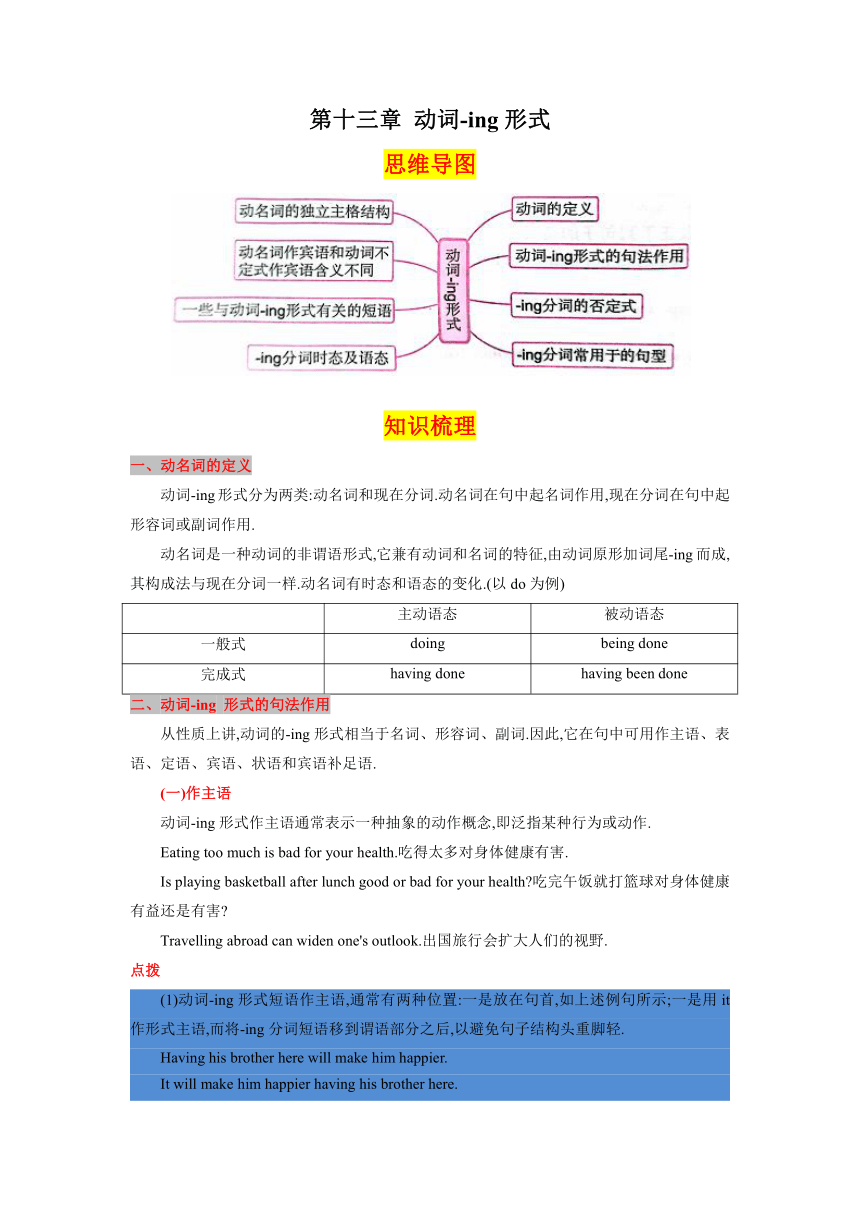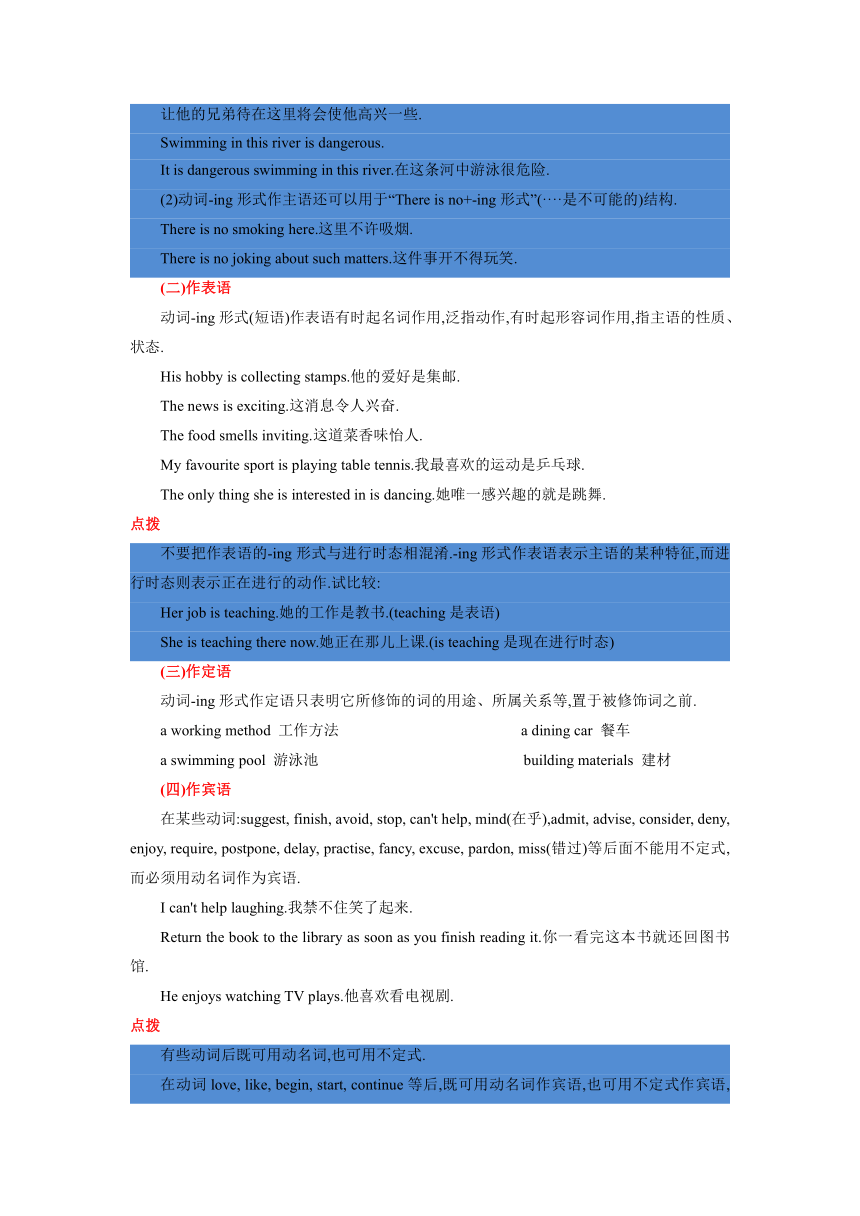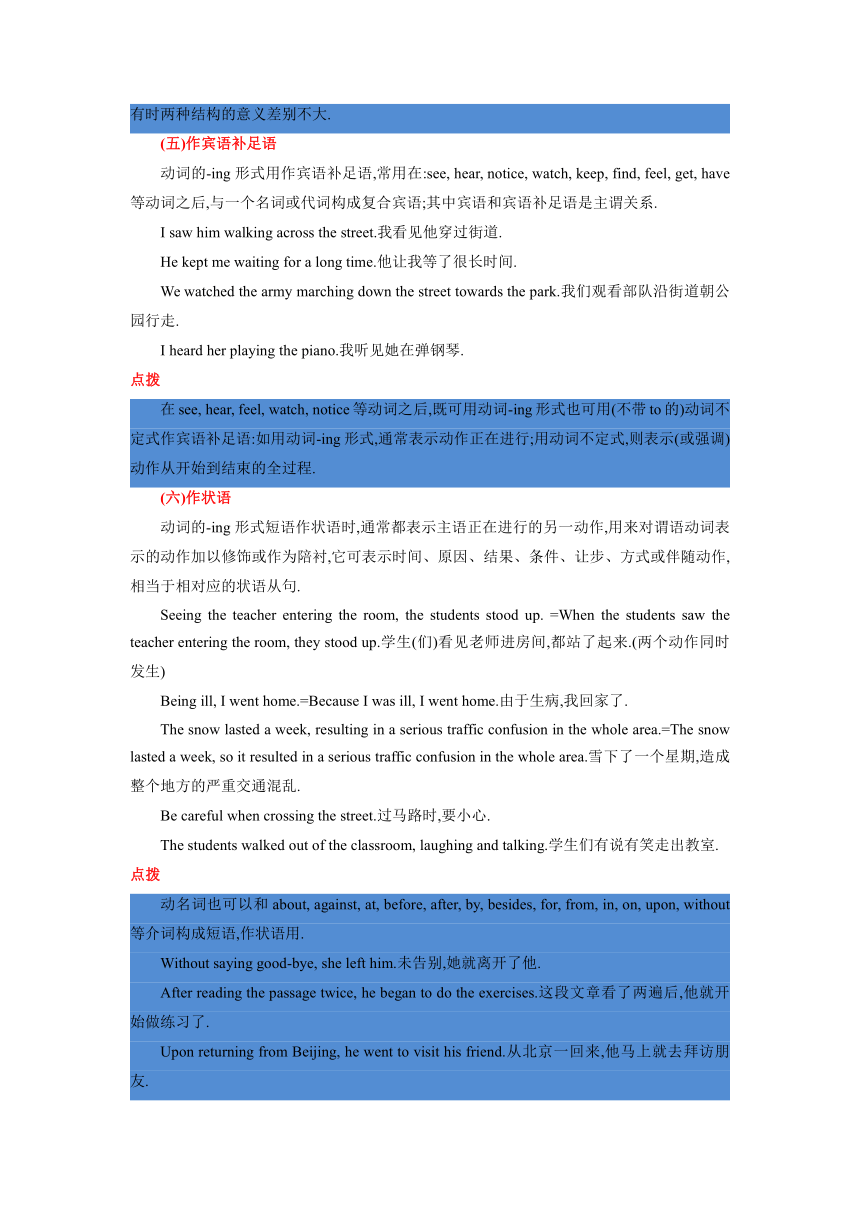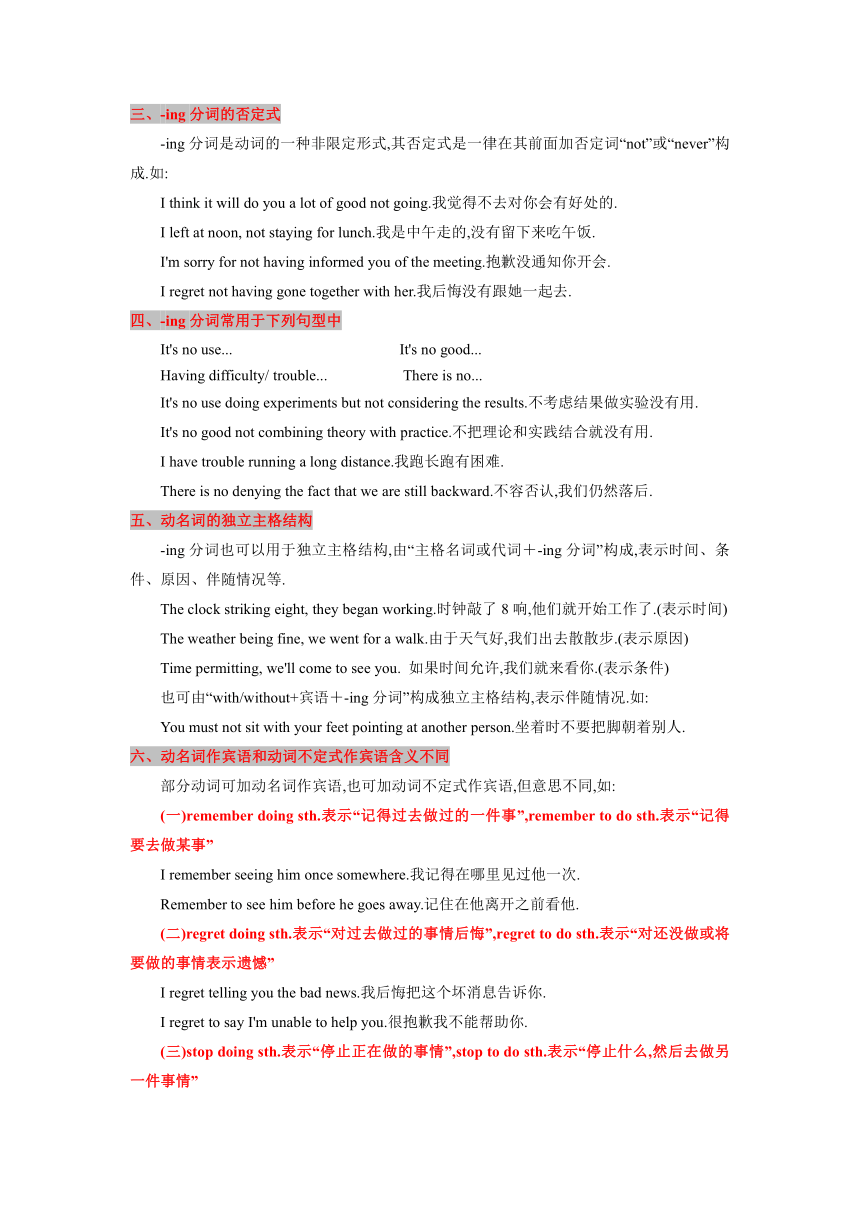第十三章动词-ing形式(思维导图+知识梳理+好题精炼)2022-2023初中英语中考语法归纳
文档属性
| 名称 | 第十三章动词-ing形式(思维导图+知识梳理+好题精炼)2022-2023初中英语中考语法归纳 |

|
|
| 格式 | docx | ||
| 文件大小 | 139.5KB | ||
| 资源类型 | 教案 | ||
| 版本资源 | 通用版 | ||
| 科目 | 英语 | ||
| 更新时间 | 2023-04-04 07:03:56 | ||
图片预览




文档简介
第十三章 动词-ing形式
思维导图
知识梳理
一、动名词的定义
动词-ing形式分为两类:动名词和现在分词.动名词在句中起名词作用,现在分词在句中起形容词或副词作用.
动名词是一种动词的非谓语形式,它兼有动词和名词的特征,由动词原形加词尾-ing而成,其构成法与现在分词一样.动名词有时态和语态的变化.(以do为例)
主动语态 被动语态
一般式 doing being done
完成式 having done having been done
二、动词-ing 形式的句法作用
从性质上讲,动词的-ing形式相当于名词、形容词、副词.因此,它在句中可用作主语、表语、定语、宾语、状语和宾语补足语.
(一)作主语
动词-ing形式作主语通常表示一种抽象的动作概念,即泛指某种行为或动作.
Eating too much is bad for your health.吃得太多对身体健康有害.
Is playing basketball after lunch good or bad for your health 吃完午饭就打篮球对身体健康有益还是有害
Travelling abroad can widen one's outlook.出国旅行会扩大人们的视野.
点拨
(1)动词-ing形式短语作主语,通常有两种位置:一是放在句首,如上述例句所示;一是用it作形式主语,而将-ing分词短语移到谓语部分之后,以避免句子结构头重脚轻.
Having his brother here will make him happier.
It will make him happier having his brother here.
让他的兄弟待在这里将会使他高兴一些.
Swimming in this river is dangerous.
It is dangerous swimming in this river.在这条河中游泳很危险.
(2)动词-ing形式作主语还可以用于“There is no+-ing形式”(····是不可能的)结构.
There is no smoking here.这里不许吸烟.
There is no joking about such matters.这件事开不得玩笑.
(二)作表语
动词-ing形式(短语)作表语有时起名词作用,泛指动作,有时起形容词作用,指主语的性质、状态.
His hobby is collecting stamps.他的爱好是集邮.
The news is exciting.这消息令人兴奋.
The food smells inviting.这道菜香味怡人.
My favourite sport is playing table tennis.我最喜欢的运动是乒乓球.
The only thing she is interested in is dancing.她唯一感兴趣的就是跳舞.
点拨
不要把作表语的-ing形式与进行时态相混淆.-ing形式作表语表示主语的某种特征,而进行时态则表示正在进行的动作.试比较:
Her job is teaching.她的工作是教书.(teaching是表语)
She is teaching there now.她正在那儿上课.(is teaching是现在进行时态)
(三)作定语
动词-ing形式作定语只表明它所修饰的词的用途、所属关系等,置于被修饰词之前.
a working method 工作方法 a dining car 餐车
a swimming pool 游泳池 building materials 建材
(四)作宾语
在某些动词:suggest, finish, avoid, stop, can't help, mind(在乎),admit, advise, consider, deny, enjoy, require, postpone, delay, practise, fancy, excuse, pardon, miss(错过)等后面不能用不定式,而必须用动名词作为宾语.
I can't help laughing.我禁不住笑了起来.
Return the book to the library as soon as you finish reading it.你一看完这本书就还回图书馆.
He enjoys watching TV plays.他喜欢看电视剧.
点拨
有些动词后既可用动名词,也可用不定式.
在动词love, like, begin, start, continue等后,既可用动名词作宾语,也可用不定式作宾语,有时两种结构的意义差别不大.
(五)作宾语补足语
动词的-ing形式用作宾语补足语,常用在:see, hear, notice, watch, keep, find, feel, get, have等动词之后,与一个名词或代词构成复合宾语;其中宾语和宾语补足语是主谓关系.
I saw him walking across the street.我看见他穿过街道.
He kept me waiting for a long time.他让我等了很长时间.
We watched the army marching down the street towards the park.我们观看部队沿街道朝公园行走.
I heard her playing the piano.我听见她在弹钢琴.
点拨
在see, hear, feel, watch, notice等动词之后,既可用动词-ing形式也可用(不带to的)动词不定式作宾语补足语:如用动词-ing形式,通常表示动作正在进行;用动词不定式,则表示(或强调)动作从开始到结束的全过程.
(六)作状语
动词的-ing形式短语作状语时,通常都表示主语正在进行的另一动作,用来对谓语动词表示的动作加以修饰或作为陪衬,它可表示时间、原因、结果、条件、让步、方式或伴随动作,相当于相对应的状语从句.
Seeing the teacher entering the room, the students stood up. =When the students saw the teacher entering the room, they stood up.学生(们)看见老师进房间,都站了起来.(两个动作同时发生)
Being ill, I went home.=Because I was ill, I went home.由于生病,我回家了.
The snow lasted a week, resulting in a serious traffic confusion in the whole area.=The snow lasted a week, so it resulted in a serious traffic confusion in the whole area.雪下了一个星期,造成整个地方的严重交通混乱.
Be careful when crossing the street.过马路时,要小心.
The students walked out of the classroom, laughing and talking.学生们有说有笑走出教室.
点拨
动名词也可以和about, against, at, before, after, by, besides, for, from, in, on, upon, without等介词构成短语,作状语用.
Without saying good-bye, she left him.未告别,她就离开了他.
After reading the passage twice, he began to do the exercises.这段文章看了两遍后,他就开始做练习了.
Upon returning from Beijing, he went to visit his friend.从北京一回来,他马上就去拜访朋友.
三、-ing分词的否定式
-ing分词是动词的一种非限定形式,其否定式是一律在其前面加否定词“not”或“never”构成.如:
I think it will do you a lot of good not going.我觉得不去对你会有好处的.
I left at noon, not staying for lunch.我是中午走的,没有留下来吃午饭.
I'm sorry for not having informed you of the meeting.抱歉没通知你开会.
I regret not having gone together with her.我后悔没有跟她一起去.
四、-ing分词常用于下列句型中
It's no use... It's no good...
Having difficulty/ trouble... There is no...
It's no use doing experiments but not considering the results.不考虑结果做实验没有用.
It's no good not combining theory with practice.不把理论和实践结合就没有用.
I have trouble running a long distance.我跑长跑有困难.
There is no denying the fact that we are still backward.不容否认,我们仍然落后.
五、动名词的独立主格结构
-ing分词也可以用于独立主格结构,由“主格名词或代词+-ing分词”构成,表示时间、条件、原因、伴随情况等.
The clock striking eight, they began working.时钟敲了8响,他们就开始工作了.(表示时间)
The weather being fine, we went for a walk.由于天气好,我们出去散散步.(表示原因)
Time permitting, we'll come to see you. 如果时间允许,我们就来看你.(表示条件)
也可由“with/without+宾语+-ing分词”构成独立主格结构,表示伴随情况.如:
You must not sit with your feet pointing at another person.坐着时不要把脚朝着别人.
六、动名词作宾语和动词不定式作宾语含义不同
部分动词可加动名词作宾语,也可加动词不定式作宾语,但意思不同,如:
(一)remember doing sth.表示“记得过去做过的一件事”,remember to do sth.表示“记得要去做某事”
I remember seeing him once somewhere.我记得在哪里见过他一次.
Remember to see him before he goes away.记住在他离开之前看他.
(二)regret doing sth.表示“对过去做过的事情后悔”,regret to do sth.表示“对还没做或将要做的事情表示遗憾”
I regret telling you the bad news.我后悔把这个坏消息告诉你.
I regret to say I'm unable to help you.很抱歉我不能帮助你.
(三)stop doing sth.表示“停止正在做的事情”,stop to do sth.表示“停止什么,然后去做另一件事情”
Let's stop talking about it.咱们停止谈论这件事情吧.
We stopped to see what happened.我们停下来去看发生了什么事情.
(四)forget doing sth.表示“忘记曾做过某事”,forget to do sth.表示“忘记去做某事”
I forgot giving the letter to her.我忘了,已经把信给她了.
I forgot to post the letter.我忘记发信了.
(五)try doing sth.表示“尝试着做某事”,try to do sth.表示“设法做某事”
Let's try doing the work some other way.我们用别的方法做这工作试试.
We must try to get everything done in time.我们必须设法及时把一切搞好.
(六)mean doing sth.表示“意味着,意思是”,mean to do sth.表示“打算、想要”
This means helping you.这意味着帮助你.
I mean to help him with it.我打算帮助他做这件事情.
七、一些与动词-ing 形式有关的短语
(一)表示有目的、有意识地进行练习或训练某项技能:do+(some)+v.-ing
do some reading 读读书 do some running跑跑步do some writing练练字
This year I am going to do more speaking.今年我要多练口语.
(二)表示做一些笼统、不具体指明的事:do+(some)+v.-ing
do some shopping 去商店买东西(不指明买哪样具体的东西)
do some washing 洗东西 do some cooking 做饭
do some cleaning 扫除 do some sewing 缝纫
(三)“go+ v.-ing形式”大部分表示从事运动、消遣或娱乐活动
go dancing 去跳舞 go swimming去游泳
go skating 去滑冰 go skiing 去滑雪
go shooting去射击 go boating去划船
go fishing去钓鱼 go hunting去打猎
go riding去骑马 go walking去散步
go running去跑步 go sailing去航海
八、-ing分词时态及语态
(一)-ing分词的特点:
-ing分词的时态分为一般式和完成式.一般式所表示的动作与谓语动词的动作往往同时发生.完成式所表示的动作发生在谓语动词的动作之前.
He insisted on finishing the work before going home.他坚持在回家前一定要先完成工作.
He didn't mention having met me.他没提及已见到了我.
I still remember having ever worked together with him.我还记得曾经与他一起共过事.
(二)-ing分词的语态
-ing分词的被动语态也有一般式和完成式两种.
The large house being built near the factory is a new hospital.工厂附近正在施工的大楼是一座新的医院.
Having been sent to the wrong address, the letter did not reach her.那封信投错了地址,她没有收到.
好题精练
选择填空
1.Taking pictures_________ very interesting.
A. is B. are C. to be D. be
2. _________ the bad news made him cry.
A. Hear B. Heard C. Hearing D.Is hearing
3. _________ a desert had always been a risk adventure.
A. being crossed .Having crossed C. Crossing D. To have crossed
4.Before he came, I'd finished_________ the whole book.
A. to read B. to have read C. reading D. read
5.I always enjoy_________ to popular music at night.
A. to listen B. listening C. that I can listen D. if I can listen
6.We are considering_________ a trip around the island.
A. take B. to take C. to be taking D. taking
7.I hope you don't mind_________ at your newspaper.
A.I look B. my looking C.I looking D. my to look
8.When a man's heart stops_________, he dies.
A. to beat B. beating C .beat D. beaten
9.I can't help_________ he is still alive.
A. thinking B. think C. to think D. thought of
10.So far as I am concerned , I prefer reading
A. than meat B. for joy C. instead of sleeping D to drinking
11.It goes without_________ that knowledge is important.
A. talking B. telling C. saying D. mentioning
12.we are looking forward_________ our friends next week.
A .to see B. to seeing C. to be seeing D. shall see
13.He spent a lot of money_________ books and magazines.
A. buy B. buying C. to buy D. bought
14.The silkworm is an insect worth_________.
A. to know B. knowing C. to be known D. being known
15.She went out without_________ good-bye to us.
A. say B. to say C. saying D. being said
16.The curious student kept on_________ questions.
A. asks B. asking C. to ask D. asked
17.He is such a strange person; there's_________ what he'll do next.
A. no knowing B. not to know C. not known D. being unknown
18.When she heard the bad news, she burst_________.
A. into crying B. out to tears C. crying D. out crying
19.You must never cross the street without_________ the light to turn green.
A. waiting B. to wait C. waiting for D. to wait for
20.Scientists succeed_________ protein out of old newspapers.
A .to make B. at making C. making D. in making
21.I became_________ after watching too much television.
A. bored B. boring C. bore D. bores
22.I felt_________ by his interest in my new invention.
A. encourage B to encourage C. was encouraged D. encouraged
23.He sat there_________ a novel.
A. read B. reading C. reads D. had read
24.Don't wake up the_________ child.
A. sleep B. slept C. sleeping D. sleepy
25.A proverb goes:"A_________ stone gathers no moss”.
A. roll B. rolling C. rolled D. rolls
26.The heavy rain kept us_________ for two hours.
A. wait B. waited C. waiting D. to wait
27.I found a dog_________ over by a car on the road.
A. to run B .run C.ran D. running
28.We found the baby_________ on the floor.
A. slept B. sleep C. asleep D. sleeping
29.Jack saw a woman_________ near the dog, so he walked up to her.
A. stood B. stands C. to stand D. standing
30.They got their ca_________ at the garage.
A. be washed B. washed C. being washed D. to have been washed
31_________ with his report, I told him to write it all over again.
A. Dissatisfactory B. Not being satisfied C. Having not satisfied D. Dissatisfying
32. _________ our shoes in our hands, we crossed the stream.
A. To carry B. Carrying C. Carried D. Carry
33. _________ my homework, I went home.
A. Having finished B. Finished C. Being finished D. Finish
34. _________ the door unlocked, I went in.
A. Finding B. Found C. Had found D. Have found
35. _________ a careless fellow, he forget all about it.
A. Is B. Be C. Being D. Was
答案:
1-5 ACCCB 6-10 DBBAD
11-15 CBBBC 16-20 BADCD
21-25 ADBCB 26-30 CBCDB
31-35 BBAAC
思维导图
知识梳理
一、动名词的定义
动词-ing形式分为两类:动名词和现在分词.动名词在句中起名词作用,现在分词在句中起形容词或副词作用.
动名词是一种动词的非谓语形式,它兼有动词和名词的特征,由动词原形加词尾-ing而成,其构成法与现在分词一样.动名词有时态和语态的变化.(以do为例)
主动语态 被动语态
一般式 doing being done
完成式 having done having been done
二、动词-ing 形式的句法作用
从性质上讲,动词的-ing形式相当于名词、形容词、副词.因此,它在句中可用作主语、表语、定语、宾语、状语和宾语补足语.
(一)作主语
动词-ing形式作主语通常表示一种抽象的动作概念,即泛指某种行为或动作.
Eating too much is bad for your health.吃得太多对身体健康有害.
Is playing basketball after lunch good or bad for your health 吃完午饭就打篮球对身体健康有益还是有害
Travelling abroad can widen one's outlook.出国旅行会扩大人们的视野.
点拨
(1)动词-ing形式短语作主语,通常有两种位置:一是放在句首,如上述例句所示;一是用it作形式主语,而将-ing分词短语移到谓语部分之后,以避免句子结构头重脚轻.
Having his brother here will make him happier.
It will make him happier having his brother here.
让他的兄弟待在这里将会使他高兴一些.
Swimming in this river is dangerous.
It is dangerous swimming in this river.在这条河中游泳很危险.
(2)动词-ing形式作主语还可以用于“There is no+-ing形式”(····是不可能的)结构.
There is no smoking here.这里不许吸烟.
There is no joking about such matters.这件事开不得玩笑.
(二)作表语
动词-ing形式(短语)作表语有时起名词作用,泛指动作,有时起形容词作用,指主语的性质、状态.
His hobby is collecting stamps.他的爱好是集邮.
The news is exciting.这消息令人兴奋.
The food smells inviting.这道菜香味怡人.
My favourite sport is playing table tennis.我最喜欢的运动是乒乓球.
The only thing she is interested in is dancing.她唯一感兴趣的就是跳舞.
点拨
不要把作表语的-ing形式与进行时态相混淆.-ing形式作表语表示主语的某种特征,而进行时态则表示正在进行的动作.试比较:
Her job is teaching.她的工作是教书.(teaching是表语)
She is teaching there now.她正在那儿上课.(is teaching是现在进行时态)
(三)作定语
动词-ing形式作定语只表明它所修饰的词的用途、所属关系等,置于被修饰词之前.
a working method 工作方法 a dining car 餐车
a swimming pool 游泳池 building materials 建材
(四)作宾语
在某些动词:suggest, finish, avoid, stop, can't help, mind(在乎),admit, advise, consider, deny, enjoy, require, postpone, delay, practise, fancy, excuse, pardon, miss(错过)等后面不能用不定式,而必须用动名词作为宾语.
I can't help laughing.我禁不住笑了起来.
Return the book to the library as soon as you finish reading it.你一看完这本书就还回图书馆.
He enjoys watching TV plays.他喜欢看电视剧.
点拨
有些动词后既可用动名词,也可用不定式.
在动词love, like, begin, start, continue等后,既可用动名词作宾语,也可用不定式作宾语,有时两种结构的意义差别不大.
(五)作宾语补足语
动词的-ing形式用作宾语补足语,常用在:see, hear, notice, watch, keep, find, feel, get, have等动词之后,与一个名词或代词构成复合宾语;其中宾语和宾语补足语是主谓关系.
I saw him walking across the street.我看见他穿过街道.
He kept me waiting for a long time.他让我等了很长时间.
We watched the army marching down the street towards the park.我们观看部队沿街道朝公园行走.
I heard her playing the piano.我听见她在弹钢琴.
点拨
在see, hear, feel, watch, notice等动词之后,既可用动词-ing形式也可用(不带to的)动词不定式作宾语补足语:如用动词-ing形式,通常表示动作正在进行;用动词不定式,则表示(或强调)动作从开始到结束的全过程.
(六)作状语
动词的-ing形式短语作状语时,通常都表示主语正在进行的另一动作,用来对谓语动词表示的动作加以修饰或作为陪衬,它可表示时间、原因、结果、条件、让步、方式或伴随动作,相当于相对应的状语从句.
Seeing the teacher entering the room, the students stood up. =When the students saw the teacher entering the room, they stood up.学生(们)看见老师进房间,都站了起来.(两个动作同时发生)
Being ill, I went home.=Because I was ill, I went home.由于生病,我回家了.
The snow lasted a week, resulting in a serious traffic confusion in the whole area.=The snow lasted a week, so it resulted in a serious traffic confusion in the whole area.雪下了一个星期,造成整个地方的严重交通混乱.
Be careful when crossing the street.过马路时,要小心.
The students walked out of the classroom, laughing and talking.学生们有说有笑走出教室.
点拨
动名词也可以和about, against, at, before, after, by, besides, for, from, in, on, upon, without等介词构成短语,作状语用.
Without saying good-bye, she left him.未告别,她就离开了他.
After reading the passage twice, he began to do the exercises.这段文章看了两遍后,他就开始做练习了.
Upon returning from Beijing, he went to visit his friend.从北京一回来,他马上就去拜访朋友.
三、-ing分词的否定式
-ing分词是动词的一种非限定形式,其否定式是一律在其前面加否定词“not”或“never”构成.如:
I think it will do you a lot of good not going.我觉得不去对你会有好处的.
I left at noon, not staying for lunch.我是中午走的,没有留下来吃午饭.
I'm sorry for not having informed you of the meeting.抱歉没通知你开会.
I regret not having gone together with her.我后悔没有跟她一起去.
四、-ing分词常用于下列句型中
It's no use... It's no good...
Having difficulty/ trouble... There is no...
It's no use doing experiments but not considering the results.不考虑结果做实验没有用.
It's no good not combining theory with practice.不把理论和实践结合就没有用.
I have trouble running a long distance.我跑长跑有困难.
There is no denying the fact that we are still backward.不容否认,我们仍然落后.
五、动名词的独立主格结构
-ing分词也可以用于独立主格结构,由“主格名词或代词+-ing分词”构成,表示时间、条件、原因、伴随情况等.
The clock striking eight, they began working.时钟敲了8响,他们就开始工作了.(表示时间)
The weather being fine, we went for a walk.由于天气好,我们出去散散步.(表示原因)
Time permitting, we'll come to see you. 如果时间允许,我们就来看你.(表示条件)
也可由“with/without+宾语+-ing分词”构成独立主格结构,表示伴随情况.如:
You must not sit with your feet pointing at another person.坐着时不要把脚朝着别人.
六、动名词作宾语和动词不定式作宾语含义不同
部分动词可加动名词作宾语,也可加动词不定式作宾语,但意思不同,如:
(一)remember doing sth.表示“记得过去做过的一件事”,remember to do sth.表示“记得要去做某事”
I remember seeing him once somewhere.我记得在哪里见过他一次.
Remember to see him before he goes away.记住在他离开之前看他.
(二)regret doing sth.表示“对过去做过的事情后悔”,regret to do sth.表示“对还没做或将要做的事情表示遗憾”
I regret telling you the bad news.我后悔把这个坏消息告诉你.
I regret to say I'm unable to help you.很抱歉我不能帮助你.
(三)stop doing sth.表示“停止正在做的事情”,stop to do sth.表示“停止什么,然后去做另一件事情”
Let's stop talking about it.咱们停止谈论这件事情吧.
We stopped to see what happened.我们停下来去看发生了什么事情.
(四)forget doing sth.表示“忘记曾做过某事”,forget to do sth.表示“忘记去做某事”
I forgot giving the letter to her.我忘了,已经把信给她了.
I forgot to post the letter.我忘记发信了.
(五)try doing sth.表示“尝试着做某事”,try to do sth.表示“设法做某事”
Let's try doing the work some other way.我们用别的方法做这工作试试.
We must try to get everything done in time.我们必须设法及时把一切搞好.
(六)mean doing sth.表示“意味着,意思是”,mean to do sth.表示“打算、想要”
This means helping you.这意味着帮助你.
I mean to help him with it.我打算帮助他做这件事情.
七、一些与动词-ing 形式有关的短语
(一)表示有目的、有意识地进行练习或训练某项技能:do+(some)+v.-ing
do some reading 读读书 do some running跑跑步do some writing练练字
This year I am going to do more speaking.今年我要多练口语.
(二)表示做一些笼统、不具体指明的事:do+(some)+v.-ing
do some shopping 去商店买东西(不指明买哪样具体的东西)
do some washing 洗东西 do some cooking 做饭
do some cleaning 扫除 do some sewing 缝纫
(三)“go+ v.-ing形式”大部分表示从事运动、消遣或娱乐活动
go dancing 去跳舞 go swimming去游泳
go skating 去滑冰 go skiing 去滑雪
go shooting去射击 go boating去划船
go fishing去钓鱼 go hunting去打猎
go riding去骑马 go walking去散步
go running去跑步 go sailing去航海
八、-ing分词时态及语态
(一)-ing分词的特点:
-ing分词的时态分为一般式和完成式.一般式所表示的动作与谓语动词的动作往往同时发生.完成式所表示的动作发生在谓语动词的动作之前.
He insisted on finishing the work before going home.他坚持在回家前一定要先完成工作.
He didn't mention having met me.他没提及已见到了我.
I still remember having ever worked together with him.我还记得曾经与他一起共过事.
(二)-ing分词的语态
-ing分词的被动语态也有一般式和完成式两种.
The large house being built near the factory is a new hospital.工厂附近正在施工的大楼是一座新的医院.
Having been sent to the wrong address, the letter did not reach her.那封信投错了地址,她没有收到.
好题精练
选择填空
1.Taking pictures_________ very interesting.
A. is B. are C. to be D. be
2. _________ the bad news made him cry.
A. Hear B. Heard C. Hearing D.Is hearing
3. _________ a desert had always been a risk adventure.
A. being crossed .Having crossed C. Crossing D. To have crossed
4.Before he came, I'd finished_________ the whole book.
A. to read B. to have read C. reading D. read
5.I always enjoy_________ to popular music at night.
A. to listen B. listening C. that I can listen D. if I can listen
6.We are considering_________ a trip around the island.
A. take B. to take C. to be taking D. taking
7.I hope you don't mind_________ at your newspaper.
A.I look B. my looking C.I looking D. my to look
8.When a man's heart stops_________, he dies.
A. to beat B. beating C .beat D. beaten
9.I can't help_________ he is still alive.
A. thinking B. think C. to think D. thought of
10.So far as I am concerned , I prefer reading
A. than meat B. for joy C. instead of sleeping D to drinking
11.It goes without_________ that knowledge is important.
A. talking B. telling C. saying D. mentioning
12.we are looking forward_________ our friends next week.
A .to see B. to seeing C. to be seeing D. shall see
13.He spent a lot of money_________ books and magazines.
A. buy B. buying C. to buy D. bought
14.The silkworm is an insect worth_________.
A. to know B. knowing C. to be known D. being known
15.She went out without_________ good-bye to us.
A. say B. to say C. saying D. being said
16.The curious student kept on_________ questions.
A. asks B. asking C. to ask D. asked
17.He is such a strange person; there's_________ what he'll do next.
A. no knowing B. not to know C. not known D. being unknown
18.When she heard the bad news, she burst_________.
A. into crying B. out to tears C. crying D. out crying
19.You must never cross the street without_________ the light to turn green.
A. waiting B. to wait C. waiting for D. to wait for
20.Scientists succeed_________ protein out of old newspapers.
A .to make B. at making C. making D. in making
21.I became_________ after watching too much television.
A. bored B. boring C. bore D. bores
22.I felt_________ by his interest in my new invention.
A. encourage B to encourage C. was encouraged D. encouraged
23.He sat there_________ a novel.
A. read B. reading C. reads D. had read
24.Don't wake up the_________ child.
A. sleep B. slept C. sleeping D. sleepy
25.A proverb goes:"A_________ stone gathers no moss”.
A. roll B. rolling C. rolled D. rolls
26.The heavy rain kept us_________ for two hours.
A. wait B. waited C. waiting D. to wait
27.I found a dog_________ over by a car on the road.
A. to run B .run C.ran D. running
28.We found the baby_________ on the floor.
A. slept B. sleep C. asleep D. sleeping
29.Jack saw a woman_________ near the dog, so he walked up to her.
A. stood B. stands C. to stand D. standing
30.They got their ca_________ at the garage.
A. be washed B. washed C. being washed D. to have been washed
31_________ with his report, I told him to write it all over again.
A. Dissatisfactory B. Not being satisfied C. Having not satisfied D. Dissatisfying
32. _________ our shoes in our hands, we crossed the stream.
A. To carry B. Carrying C. Carried D. Carry
33. _________ my homework, I went home.
A. Having finished B. Finished C. Being finished D. Finish
34. _________ the door unlocked, I went in.
A. Finding B. Found C. Had found D. Have found
35. _________ a careless fellow, he forget all about it.
A. Is B. Be C. Being D. Was
答案:
1-5 ACCCB 6-10 DBBAD
11-15 CBBBC 16-20 BADCD
21-25 ADBCB 26-30 CBCDB
31-35 BBAAC
同课章节目录
- 词法
- 名词
- 动词和动词短语
- 动词语态
- 动词时态
- 助动词和情态动词
- 非谓语动词
- 冠词
- 代词
- 数词和量词
- 形容词副词及其比较等级
- 介词和介词短语
- 连词和感叹词
- 构词法
- 相似、相近词比较
- 句法
- 陈述句
- 一般疑问句和否定疑问句
- 特殊疑问句及选择疑问句
- 反意疑问句
- 存在句(There be句型)
- 宾语从句
- 定语从句
- 状语从句
- 主谓一致问题
- 简单句
- 并列句
- 复合句
- 主谓一致
- 主、表语从句
- 名词性从句
- 直接引语和间接引语
- 虚拟语气
- 感叹句
- 强调句
- 倒装句
- 祈使句
- 句子的成分
- 句子的分类
- 题型专区
- 单项选择部分
- 易错题
- 完形填空
- 阅读理解
- 词汇练习
- 听说训练
- 句型转换
- 补全对话
- 短文改错
- 翻译
- 书面表达
- 任务型阅读
- 语法填空
- 其他资料
